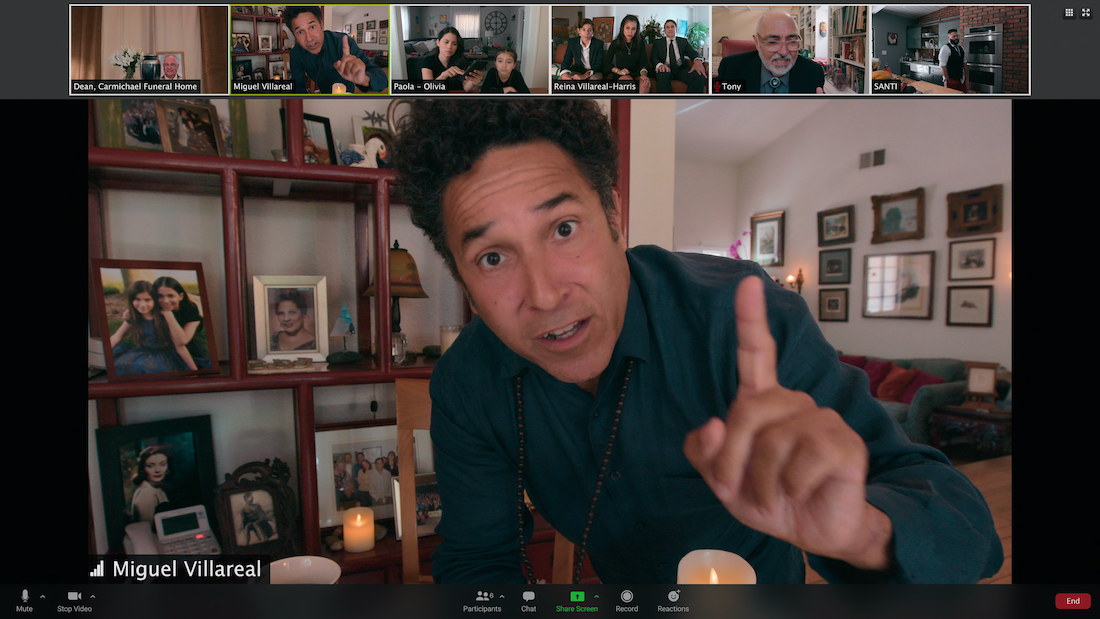The simple, yet complicated fact that the pandemic isn’t over would have shocked anyone during March. But in the months since Covid-19 caused statewide lockdowns, the road to recovery appears endless. Trying to create art reflective of such a moment is tricky. It wasn’t until 1943, when Howard Hawks released “Air Force,” that a major director recounted Pearl Harbor. The 2002 documentary “9/11” aired on CBS six months after the attack. But we’re not six months out from the pandemic, we’re more than six months in.
Now from creator Hilary Weisman Graham comes her Netflix anthology series “Social Distance.” Remotely-shot during quarantine, the show’s eight disconnected episodes recount the disruption of our everyday realities and customs: from funerals to relationships—precipitated by quarantines. And in a meta-sense—each episode’s cast is often composed of not just the actors but their real-life families too—the fictional anthology serves as a document for how these performers have coped with these world changing events. Even so, “Social Distance” suffers from feeling rushed and often heavy-handed.
Some episodes barely lift from the ground. For instance, “A Celebration of the Human Life Cycle” — starring Oscar Nuñez—sees a family, during a virtual memorial service, struggling to mourn their deceased father. While some slack might be offered for the show’s look, the problem doesn’t stem from a cheap quality, but an aesthetic that’s all too refined: Not only are the Zoom icons at the bottom of the screen sometimes out of frame, but the picture quality is too clean. On top of that, the actors also struggle speaking to a screen. There’s an artificiality to the whole affair that struggles to fully immerse us in its pathos.
The same can be said of the episode “Zero Feet Away”—about a gay male couple holding together a fraying relationship. Some of the scenes feature shots not at all resembling either a webcam or the pair’s home monitoring system. If the purpose is to envelope us in their world, a full commitment to the live-feed aesthetic is required.

The problem for Graham creating a series like “Social Distance” is the distance. Many Americans never left their respective quarantine because new waves are still washing across city limits, county lines, and state borders. It’s difficult to know the blast when you’re still in the shockwaves. And due to the writers and actors’ relative proximity to the events, the show’s rawness produces a heavy-handed effect. Take episode seven, which follows a gamer named Mia (Kylie Liya Page) as she builds up the courage to tell her teammate Jake (David Iacono) about her attraction to him. Mia bends her interests, and even her looks, to appeal to Jake. But it’s a sudden twist—separate from their budding relationship—which upends whatever lesson the narrative might be imparting.
The final episode, “Pomp and Circumstance” ventures to further extremes. While setting up audio and video equipment for a virtual graduation, a teenager named Corey (Asante Blackk of “When They See Us“) engages in a heated disagreement with his boss and AV owner John (Ayize Ma’at, Blackk’s real-life father). The militant teen and the cautious adult collide clash over the strategies used during the Black Lives Matter protests. The strategies for enacting change employed by Black people have evolved from generation to generation. For instance, Booker T. Washington preached racial mobility through economics: Financial freedom equaled real freedom. Later, Martin Luther King Jr. called for empowerment through voting. And soon after, the Black Panthers espoused armed resistance in the struggle for Black Liberation. The same generational conflicts drive a wedge between Corey and John, and in the process, the latter lodges insults he can’t take back. Though Blackk and his father offer powerful performances, further supported by an impactful Lovie Simone (“Selah and the Spades“), the weight of the raw dialogue is too much for them to carry.

The only episode which seems to strike the right timbre is “Humane Animal Trap,” starring real-life husband-and-wife Dylan and Becky Ann Baker as retirees Neil and Caroline, respectively. Caroline has thrown Neil’s retirement plans, such as lounging in their woodland cottage, to wind, by returning to work as a volunteer nurse during the pandemic. Seeing his wife take flight to the hospital, the cautious Neil is troubled by her not only putting her life at risk, but their future together, too. Dylan Baker is one of the few performers in “Social Distance” who knows what elderly aloofness—when they can’t see the screen—looks like on a Facetime call. The natural dynamic between the real-life married couple, especially when their characters fight, also provides easy fuel. Most importantly, there’s a subtlety to how Caroline imparts her restless independence, whether it’s her eyes drifting off during a game of Scrabble, or her amused facial expression in the presence of Dylan’s panic. It’s an all-around fantastic performance by Becky Ann Baker.
“Social Distance” is filled with clear-eyed acting from an impressive ensemble, which also includes Mike Colter, Peter Scanavino, and Ali Ahn. But the narratives themselves feel rushed, and not just because of their breezy 20-minute runtimes. It’s small details like remaining committed to the series’ visual style, and even hammering down the timelines—in one episode a character says they’ve been in lockdown for months when it’s only early-April, which unravels the anthology’s bid for realism. With some more spit and shine, the material might reach the caliber of the actors delivering it. Though Graham’s “Social Distance” tries to speak to the now by summing up the ordeal of this year, its pathos is buried in mistakes that could’ve been fixed with time.
Whole season screened for review.












